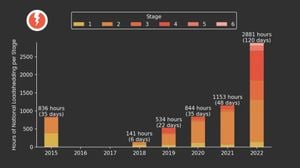Vietnam's Ministry of Public Security has unveiled ambitious plans for the recruitment of new candidates for the year 2025, establishing quotas and broadening opportunities across various educational platforms. This announcement, made in January, reflects the ministry's commitment to bolstering its forces with diverse and skilled individuals.
The planned intake includes 2,200 candidates for universities, 300 for intermediate courses, and 850 for those pursuing second degrees, emphasizing the ministry's initiative to appeal to individuals across different educational backgrounds. The recruitment targets are strategically segmented according to geographic regions, ensuring accessibility for all potential candidates regardless of their location.
For the northern region, which encompasses provinces such as Ha Giang and Cao Bang, the specially defined areas include mountainous zones with specific quotas for each locality. The southern region similarly addresses cities like Ho Chi Minh City and its surrounding provinces, demonstrating the ministry's intent to cover all bases across Vietnam.
Key changes to the examination process are also noteworthy. Spanning 180 minutes, the new examination format consists of three parts: mandatory essay questions, compulsory multiple-choice questions, and optional subjects to choose from. This revamped structure aims not only to streamline the selection process but also to engage candidates more thoroughly.
The Ministry of Public Security has articulated its motivations for these changes. "The new recruitment will allow us to attract diverse applicants from varying educational backgrounds," said officials during the announcement. This sentiment resonates as they express the necessity for adaptable and well-educated personnel within the public security domain.
"This shift aims to address the growing needs of the Public Security forces for skilled personnel," one official stated, underscoring the ministry’s commitment to modernizing its recruitment practices to match current trends and requirements.
Significantly, the new policies extend beyond just numbers; they indicate a broader strategy to incorporate individuals from various professional backgrounds to create a more dynamic workforce. The Ministry's intent is clear: to build public security forces capable of meeting modern challenges with innovation and dexterity.
Among those taking part will be high school graduates, enrolled soldiers completing their service, and citizens ready to take on roles within the Public Security framework. With such inclusive practices, the ministry is expected to attract over 3,000 new entrants through its various programs ranging from degree holders to specialized positions targeted within public security.
The geographic distribution of recruits aims to reflect the nation's diversity, ensuring the public security institutions are representative of the citizens they serve. Recruitment will include areas from the northern highlands down to the southern coasts, drawing talent where it is most underrepresented.
Officials plan to implement structured guidelines and timelines to maximize outreach, especially targeting remote areas to encourage local engagement. "We are prepared to implement these plans with structured guidance and clear timelines to maximize our outreach, especially to remote areas," stated one recruitment officer. This commitment to thorough implementation speaks volumes about the ministry's aim to genuinely engage and connect with potential recruits.
Vietnam's advancing socio-economic structures and initiatives push the Ministry of Public Security to refine its approach to personnel recruitment and training. By focusing on the skills of new recruits and aiming to reflect the changing dynamics of Vietnamese society, the ministry is forging pathways to bring about significant improvements within its ranks.
These efforts culminate not just as administrative changes but also as proactive steps toward fortifying the nation's capability to address both current and future challenges.



